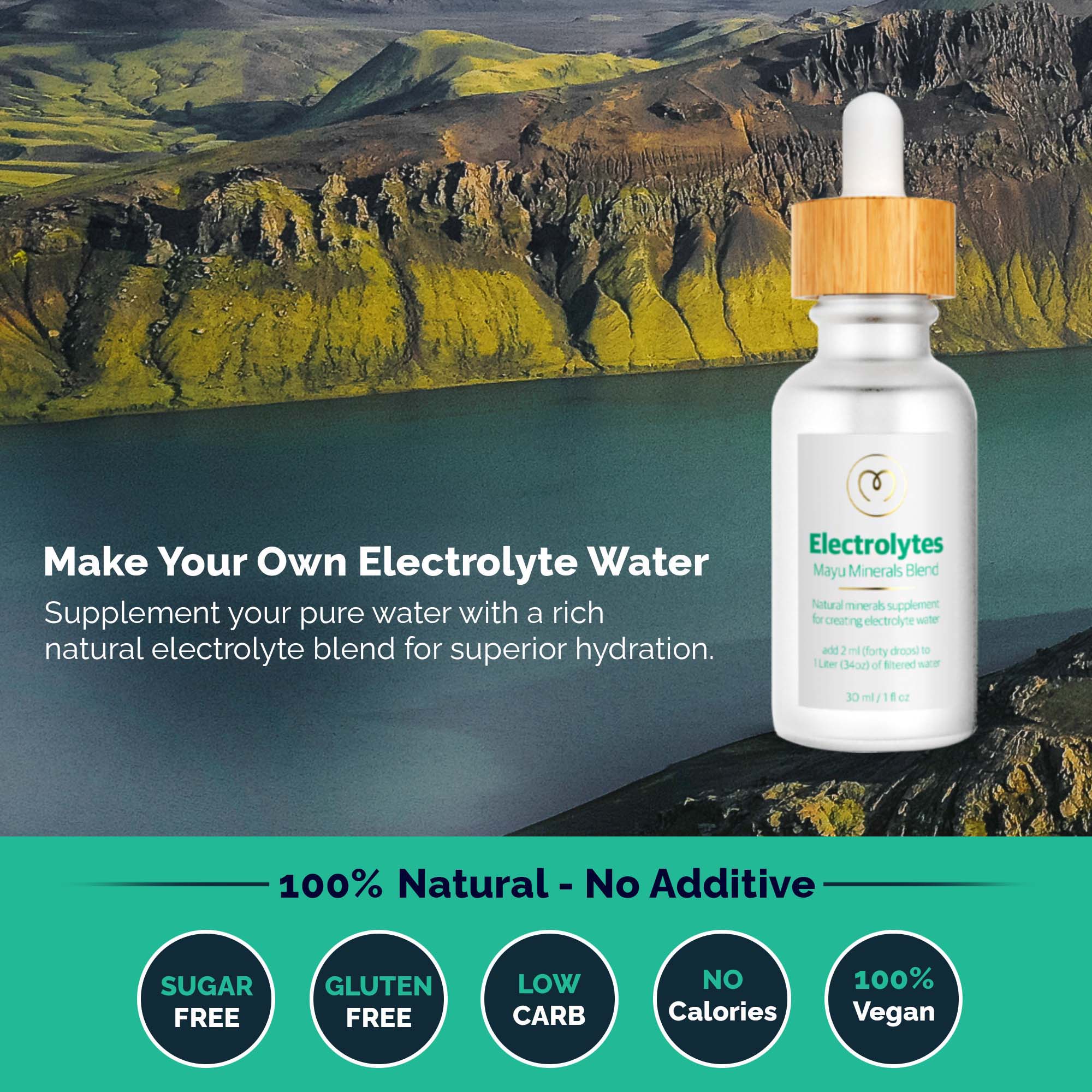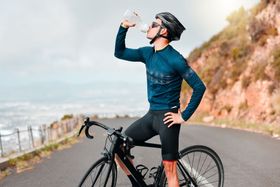Why Winter Needs Water: The Importance of Staying Hydrated
Did you know that winter can be just as dehydrating as summer? Despite the cold weather, your body still needs ample hydration to function optimally.
Updated February 4, 2025

On a crisp winter day, it's easy to forget about hydration. We bundle up in layers and focus on staying warm, but we often overlook the importance of drinking water.
Winter is a sneaky time for dehydration. The dry, heated indoor air, the reduced feeling of thirst, and the decreased desire to drink cold water can silently drain your body's moisture reserves. This can lead to dry skin, low energy, and a weakened immune system.
To combat winter dehydration, make hydration a non-negotiable part of your routine. By staying hydrated, you can improve your overall health and well-being during the winter months.
» Stay hydrated during winter using an essential blend of minerals
Can Cold Cause Dehydration?
A healthy person's core body temperature is typically around 37°C (98.6°F), with a normal range of about 0.5°C (0.9°F) above or below this. This range is essential for the body's metabolic processes to work properly [1].
During winter, your body uses thermoregulation to maintain a stable internal temperature [2]. But these changes can increase hydration needs in the following ways:
- Circulation: Cold can constrict the blood vessels to reduce heat loss and prioritize warming core organs, which makes the heart work harder, increases blood pressure, and dehydrates the body.
- Moisture Loss: In cold weather, the body also produces more urine as it regulates this higher blood pressure, leading to increased fluid loss.
- Respiration: Have you seen the vapor that comes out of your mouth when you breathe in cold air? It happens because your lungs warm and humidify the air inside of them, which means you actually lose water through the air as you exhale.
» Breathe easier: Learn how water can improve asthma symptoms
How Winter Hides Your Thirst
People often underestimate their hydration needs during colder periods as the shift in physiological processes results in the following:
Heat Retention
The body prioritizes heat retention in cold conditions to protect vital organs. This temperature regulation can reduce the body's signals of thirst, even when it's dehydrated. Research suggests that cold exposure can decrease thirst by up to 40%, regardless of hydration status or activity level [3].
» Is all water created equal? Discover the healthiest choice for you
Changes in Daily Routines
People tend to be less active during colder periods, reducing their participation in intense physical activities or outdoor sports. This decreased activity level can lead to lower water intake, even though the body still requires regular fluid intake.
Environmental Conditions
Indoor heating devices, such as wood-burning fireplaces and heaters, are a common heat source during winter. But, these devices can dry out the skin and airways, leading to increased water loss without noticeable sweating.
» Ditch the sugary drinks: Supercharge your hydration with electrolytes
Winter Dehydration Symptoms
Recognizing the signs of dehydration is essential for timely intervention. Common symptoms include:
- Dark-colored urine: A clear indicator that hydration is lacking.
- Dry mouth and lips: Often the first noticeable signs.
- Fatigue and tiredness: General lethargy may indicate fluid deficiency.
- Headaches: These can result from insufficient hydration.
- Constipation: A lack of fluids can impact digestive health.
- Irritability and difficulty concentrating: Cognitive functions may decline with dehydration.
- Dry skin: Skin may become less elastic and more prone to cracking
» Beat dehydration fast: Discover the best water for rapid recovery
6 Reasons Hydration is Crucial During Winter
1. Healthier Skin
Hydration is key to maintaining healthy skin, especially during the dry winter months. It helps keep skin moisturized and elastic, reducing dryness, redness, and flaking.
2. Stronger Immune System
Proper hydration is essential for a strong immune system, especially during winter. It helps keep the linings of our airways moist, acting as a barrier against viruses and bacteria [5]. These linings contain important antibodies that help fight infection.
Hydration also supports the production of lymph, a fluid that carries immune cells to fight infection. Additionally, it helps flush out toxins and waste, reducing the burden on the immune system.
» Feeling under the weather? Conquer cold and flu with the right drinks
3. Boosted Endurance
During exercise, the body loses fluids through sweat, breathing, and increased urination. Dehydration reduces blood volume, limiting oxygen and nutrient delivery to muscles, which can lead to decreased endurance and performance.
Proper hydration is crucial for maintaining electrolyte balance, essential for muscle function, and preventing cramps. It also helps regulate body temperature, even in cold conditions, reducing the risk of overheating.
After exercise, hydration aids in removing waste products like lactic acid, reducing muscle soreness and promoting recovery. At higher altitudes, dehydration can worsen symptoms like fatigue, headaches, and altitude sickness. By staying hydrated, you can improve your performance, reduce the risk of injury, and enhance your overall experience.
» Feeling sluggish during your sweat session? Learn how water can help
4. Enhanced Metabolism
Staying hydrated is crucial for keeping warm during winter. Proper hydration supports our body's ability to generate heat through metabolic processes. It helps our cells produce energy efficiently, which is essential for maintaining body temperature in cold conditions.
Hydration can also aid in weight management by supporting fat metabolism and digestion.
» Struggling with bloating? Try the power of water for a smooth gut
5. Better Sleep Quality
Staying hydrated can help you sleep better, especially during the winter months when indoor heating can dry you out. Proper hydration helps regulate body temperature, making it easier to fall asleep and stay asleep. Hydration also supports the production of melatonin, a hormone that helps regulate sleep-wake cycles.
» Ensure senior well-being with electrolytes for optimal hydration
6. Immune System Detoxification
Staying hydrated helps our bodies flush out toxins and waste products. Drinking water reduces the burden on our immune system, allowing it to focus on fighting off infections. By staying hydrated, we can help strengthen our immune system and reduce our risk of getting sick during winter.
Recommended Water Intake During Winter
If you want to maintain overall health and support weight loss, you should drink 8-10 glasses (2-2.5 liters) of water daily. A personalized approach suggests drinking half your body weight in ounces of water.
For example, a 150-pound person should aim for 75 ounces. But, water needs vary based on activity level and climate. Active people or those in hot weather may require more.
Other factors to consider when consuming water include:
Age
Water needs change as we age due to differences in body size, metabolism, and kidney function [6].
- Children (1-12 years): Need 1.3-1.7 liters per day to fuel their active lifestyle and growing bodies.
- Adults (18-64 years): Require 2-3 liters per day to support muscle function, metabolism, and temperature regulation.
- Older adults (65+ years): Often need similar amounts as adults, but are more at risk of dehydration due to changes in thirst sensation and kidney function.
» Get fun hacks to keep your kids hydrated (and how much they need!)
Sex
Men often need more water than women due to their generally higher muscle mass and calorie intake. On the other hand, pregnant and breastfeeding women have increased water needs to support their bodies and milk production.
Body Composition
People with more muscle mass need more water than those with more body fat because muscle tissue holds more water. But even people with higher body fat still need to stay hydrated for overall health.
» Ready to boost your hydration? Learn how to make structured water
Activity Level
Physical activity makes you sweat more, which means you lose more fluids. It also speeds up your metabolism, causing your body to use water faster. To stay hydrated, you need to drink more water.
The American College of Sports Medicine recommends [7]:
- Before exercise: Drink 500-600 milliliters (about 2 cups) of water 2 hours before you start.
- During exercise: Drink 200-300 milliliters (about 1 cup) of water every 10-20 minutes.
How to Stay Hydrated in Winter
To appropriately address your hydration needs, you can use either of the following strategies:
- Drink Warm Fluids: Opt for warm beverages like herbal teas, hot water with lemon, or broths. These not only provide hydration but also comfort in cold weather.
- Incorporate Water-Rich Foods: Include foods with high water content in your diet. Fruits like watermelon and oranges and vegetables such as cucumbers and celery can contribute significantly to your overall fluid intake. Soups and stews are also excellent options during winter.
- Set Hydration Goals: Establish a daily water intake goal based on guidelines (approximately 3.7 liters for men and 2.7 liters for women, including food sources) and track your progress using apps or journals.
- Use Reminders: Set reminders on your phone or use hydration-tracking apps to prompt you to drink water throughout the day. This can help counteract the reduced thirst response common in winter.
- Carry a Water Bottle: Always carry a reusable water bottle with you. Having it on hand serves as a visual reminder to drink more fluids regularly.
- Limit Caffeine and Alcohol: Reduce consumption of caffeinated beverages and alcohol, as both can act as diuretics and contribute to dehydration. If you drink caffeine, balance it with additional water.
» Tame your tap: Learn ways to soften hard water at home
Defeating Winter's Deceptive Dryness
Winter can be a sneaky time for dehydration. The dry, heated indoor air, the reduced feeling of thirst, and the decreased desire to drink cold water can silently drain your body's moisture reserves. This can lead to dry skin, low energy, and a weakened immune system.
To combat this, make a conscious effort to drink water throughout the day, even if you don't feel thirsty. Keep a water bottle handy and sip on it regularly. By staying hydrated, you'll maintain your energy levels, support your immune system, and keep your skin looking its best all winter long.
References:
- H. Hymczak et al., “Core Temperature Measurement—Principles of correct measurement, problems, and Complications,” International Journal of Environmental Research and Public Health, vol. 18, no. 20, p. 10606, Oct. 2021, doi: 10.3390/ijerph182010606. Available: https://doi.org/10.3390/ijerph182010606
- E. V. Osilla, J. L. Marsidi, K. R. Shumway, and S. Sharma, “Physiology, temperature regulation,” StatPearls - NCBI Bookshelf, Jul. 30, 2023. Available: https://www.ncbi.nlm.nih.gov/books/NBK507838/
- R. W. Kenefick, M. P. Hazzard, N. V. Mahood, and J. W. Castellani, “Thirst Sensations and AVP Responses at Rest and during Exercise-Cold Exposure,” Medicine & Science in Sports & Exercise, vol. 36, no. 9, pp. 1528–1534, Sep. 2004, doi: 10.1249/01.mss.0000139901.63911.75. Available: https://doi.org/10.1249/01.mss.0000139901.63911.75
- C. Wei, “Hydration and digestion: the essential connection,” Prime Scholars, Oct. 24, 2024. Available: https://www.primescholars.com/articles/hydration-and-digestion-the-essential-connection-131634.html
- H. O. Koskela, “Cold air-provoked respiratory symptoms: the mechanisms and management,” International Journal of Circumpolar Health, vol. 66, no. 2, pp. 91–100, Apr. 2007, doi: 10.3402/ijch.v66i2.18237. Available: https://doi.org/10.3402/ijch.v66i2.18237
- U. Faizan and A. S. Rouster, “Nutrition and hydration requirements in children and adults,” StatPearls - NCBI Bookshelf, Aug. 28, 2023. Available: https://www.ncbi.nlm.nih.gov/books/NBK562207/#:~:text=Go%20to%3A-,Issues%20of%20Concern,-Children
- V. A. Convertino et al., “Exercise and fluid replacement,” Medicine & Science in Sports & Exercise, vol. 39, no. 2, pp. 377–390, Feb. 2007, doi: 10.1249/mss.0b013e31802ca597. Available: https://journals.lww.com/acsm-msse/fulltext/2007/02000/exercise_and_fluid_replacement.22.aspx
Disclaimer: The information published by MAYU Water is not a substitute for the expert knowledge, advice, and recommendations of trained professionals. We strongly recommend consulting with industry experts and primary or scientific sources before making any health, research-related, or other important decisions.















































